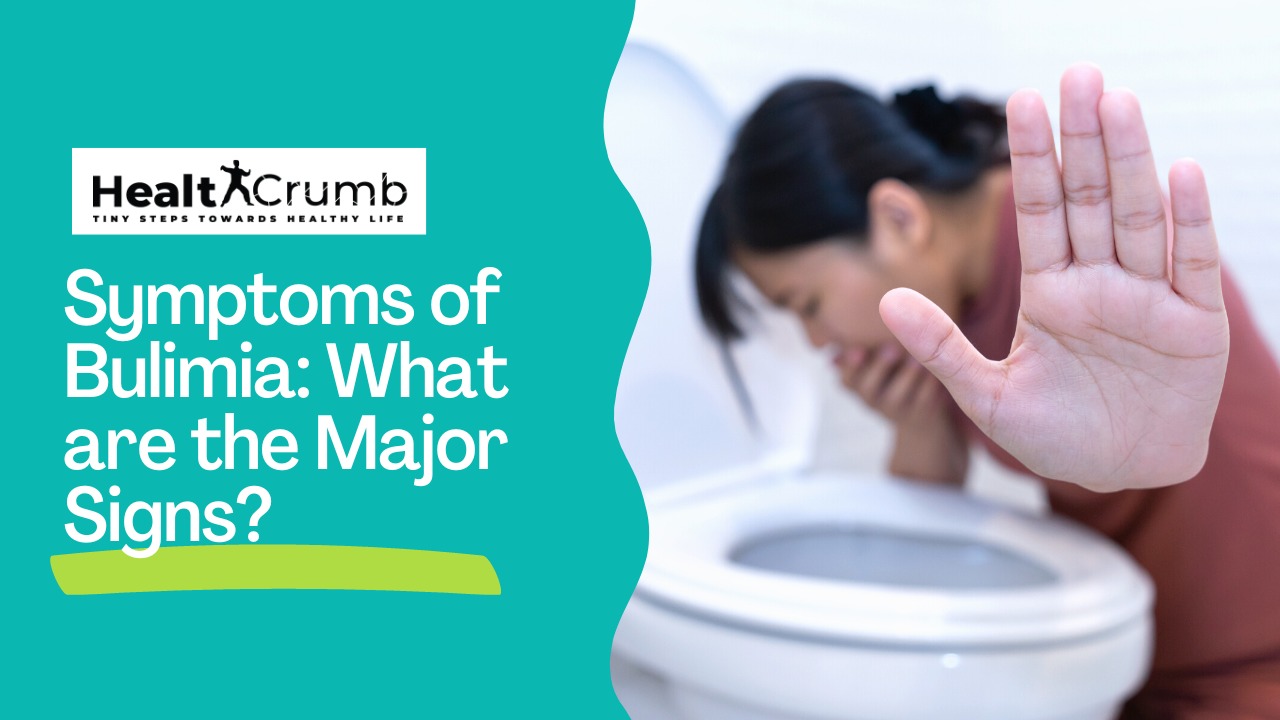Bulimia nervosa is a mental disorder characterized by symptoms of recurrent cycles of binge-eating and purging. These cycles can last for hours, days, or even weeks. During the binge-eating phase, people may consume an abnormally large number of calories in a short period of time. They may also eat high-fat food and avoid carbohydrates.
In the purging phase, people may vomit, use laxatives or diuretics, or exercise to lose weight. Bulimia nervosa can cause serious health problems, including an increased risk for developing diabetes and heart disease. Here in the article, we’ll discuss what are the symptoms of bulimia and what causes it.
What is Bulimia?
Bulimia is an eating disorder characterized by recurrent episodes of binge-eating followed by purging or weight-loss measures, such as vomiting, fasting, or excessive exercise. Individuals with bulimia may also experience intense fear of gaining weight and intense guilt or shame about their bodies.
Bulimia nervosa is an eating disorder that is characterized by binging and purging. Signs and symptoms of bulimia include: irregular eating habits, unsafe weight-loss practices such as extreme dieting and fasting, feeling of being out of control when eating, feeling overwhelmed or trapped when trying to stop the behavior, mood swings, intense fear of being weightless or gaining weight, and damage to teeth and gums from over-purging.
Symptoms of Bulimia
When someone suffers from bulimia nervosa, they have an intense urge to eat a large amount of food in a short period of time, followed by feelings of guilt and disgust. In order to avoid gaining weight, people with bulimia often purge or vomit their food. Unfortunately, this cycle can lead to serious health problems, including malnutrition and dehydration. Here are some of the most common symptoms of bulimia:
- irregular eating habits
- binge eating episodes (eating much more than is necessary to feel full, followed by feeling extreme guilt or shame)
- extreme purging (vomiting, binging, or using laxatives or diuretics)
- poor physical and mental health
- impact on relationships and school/work performance
The major symptoms of bulimia include:
- Recurrent episodes of binge eating (eating an excessive amount of food in a short period of time), which may lead to weight gain
- Purging (either through self-induced vomiting, laxative use, or excessive exercise), which often results in weight loss or body loss in excess of 10% of body weight
- Fear of gaining weight and intense guilt or shame about one’s body
- Frequent thoughts about food and calories
- Preoccupation with being thin
- Intense worry about dieting and weight
- Difficulty concentrating, feeling restless, and feeling irritable
Bulimia is a eating disorder that is characterized by binge eating and purging. It is a serious mental illness that can seriously impact your health. Here are the major symptoms of bulimia:
Feeling out of control when eating
2. A preoccupation with food and weight
3. Eating fast, without stopping to take bites or chew food properly
4. Eating until feeling stuffed or uncomfortable, even if it means over-eating
5. Feeling disgusted with oneself and having disordered thoughts about food
6. Having a distorted body image, where you think you are overweight even when you aren’t
7. Feeling ashamed or embarrassed about your eating behavior
8. Poor oral hygiene (due to over-purging)
9. Damage to teeth and gums from purging
1. Constantly feeling out of control when it comes to food.
2. Eating large amounts of food in a short period of time, even if this means binging or overeating.
3. Frequently using laxatives or other weight-loss methods to try and lose weight quickly.
4. Feeling guilty or ashamed after eating food, especially if you believe that you’re not supposed to have any calories.
5. Feeling restless, irritable, or anxious after meals.
6. Seeing yourself as a bad person because of your eating habits.
7. Suffering from poor physical health as a result of your bulimia, including problems with your teeth, skin, and bones.
Major signs and symptoms of bulimia nervosa include:
- Recurrent cycles of binge-eating and purging, which can last for hours, days, or even weeks.
- Consumption of an abnormally large number of calories in a short period of time during the binge eating phase.
- Eating high-fat food and avoiding carbohydrates during the binge eating phase.
- Vomiting, using laxatives or diuretics, or exercising to lose weight during the purging phase.
- A feeling of guilt or shame about one’s body size or shape.
- Frequent thoughts about food and food consumption.
- Recurrent episodes of overeating (bingeing) and then fasting or trying to lose weight in a manner that causes significant weight loss or harm to one’s health
- A change in body shape or size, particularly an increase in weight or an accumulation of fat around the waist
- Extreme worry about being overweight or about how one looks in clothes
- Obsession with food and calories
- Irritability when not allowed to eat food or when food is not consumed in the desired amount
- Distorted views about one’s body image, self-esteem, and ability to control
Bulimia nervosa is a mental illness characterized by binge eating and purging, or making an effort to lose weight rapidly. In order to help those who may be struggling with this disorder, here are the five most common symptoms of bulimia nervosa to watch for.
1. Extreme overeating
2. Intense feelings of guilt or shame after eating
3. Unwanted weight gain or loss
4. Repeated attempts to purge or get rid of food
5. Feeling out of control and agitated when eating
Other symptoms may include self-loathing, low self-esteem, and recurrent thoughts about weight loss or food.r
Major signs and symptoms of bulimia include:r
1) repetitive secretive eating habits;r
2) extreme concern about body weight or shape;r
3) irregular menstrual periods due to malnutrition;r
4) dry skin and hair;r
5) tooth decay;r
6) excess muscle tissue;r
7) chronic fatigue;r
8) depression or anxiety.
The major signs of bulimia include eating much more than one is physically hungry, feeling a strong need to purge or vomit after every meal, being obsessed with weight and body shape, reducing food intake to very low levels, and exercising excessively.
Bulimia nervosa is a serious eating disorder that can lead to serious health problems. Here are the five major signs of bulimia nervosa so that you can identify them in yourself or a loved one:
- A change in diet or eating habits– someone with bulimia nervosa may start to restrict their caloric intake or focus on specific types of food, even if this leads to weight gain.
- Intense and uncontrolled overeating– someone with bulimia nervosa may eat an excessive amount of food in a short period of time (within 2-3 hours), leading to extreme weight gain or muscle loss.
- Hair loss, rash, and electrolyte imbalance– due to frequent vomiting, stress on the body’s organs and muscles, and irregular menstruation, people with bulimia nervosa are at an increased risk for developing electrolyte imbalance, dehydration, and other physical problems.
- Trouble sleeping– people with bulimia nervosa often have trouble sleeping due to the stress caused by their disorder and the constant worry about weight gain or loss.
-Excessive eating and drinking in an attempt to regulate your weight
-Frequent binging and purging (vomiting and/or using laxatives or diuretics)
– Feeling out of control with food and eating habits
– Feeling ashamed, embarrassed, or like a failure because of your weight
– Aches and pains from overeating or purging
The Different Types of Bulimia
Bulimia is a mental disorder that is characterized by an excessive eating disorder. The different types of bulimia are classified according to the type of food they focus on. There are three main types of bulimia: purging-type bulimia, binge-eating/purging type bulimia, and selective eating disorder with over- compensatory behavior (EDSB).
The most common symptom of bulimia is recurrent episodes of binge eating and purgeing. These episodes can last for hours, days, or even weeks. Other symptoms may include feeling out of control during the binge eating and feeling disgusted, guilty, or regretful afterward.
EDSB is a relatively new type of bulimia that is being diagnosed more and more. People with EDSB usually have a normal body image and think they are able to control their food intake. However, they continue to overeat even when it causes them to feel sick or injured. They may also engage in ritualistic behaviors such as fasting or vomiting in order to rid themselves of food.
There is no one cause for bulimia, but it is believed to be caused by a combination of genetic and environmental factors.
Purging-type bulimia is characterized by recurrent episodes of purging, which usually involve vomiting or using laxatives.
Binge-eating/purging type bulimia is characterized by recurring episodes of binge-eating and purging.
Selective eating disorder with over- compensatory behavior (EDSB) is a relatively new type of bulimia that is being diagnosed more and more. People with EDSB usually have a normal body image and think they can control their food intake. However, they continue to overeat even when it causes them to feel sick or injured. They may also engage in ritualistic behaviors such as fasting or vomiting to rid themselves of food.
Prevention of Bulimia
Symptoms of Bulimia: What are the Major Signs?
The Diagnostic and Statistical Manual of Mental Disorders, Fifth Edition (DSM-5), defines bulimia nervosa as a disorder characterized by recurrent episodes of binge eating and an attendant feeling of extreme distress or anxiety. To be diagnosed with bulimia nervosa, an individual must have at least three cycles of binge eating (eating more than 800 grams in one sitting) and one episode of purging (bingeing and then vomiting, using laxatives, or exercising excessively).
How to Deal with Bulimia Symptoms
There are many symptoms associated with bulimia, but the most common are:
- Excessive eating, usually binge eating
- Rapid weight loss or gain
- Unusual tiredness or anemia
- Constipation or diarrhea
- Problems with sex drive
- Changes in mood or personality
- Physical changes, such as hair loss, dry skin, and stretch marks
If you’re experiencing any of these signs and you think you may have bulimia, it’s important to seek out help. Here are some tips on how to deal with bulimia symptoms:
1. Talk to a trusted friend or family member about what’s going on. It can be difficult to admit that we have a problem, but talking about it can help us figure out how to best address it.
2. Seek professional help if necessary. A mental health professional can provide support and guidance as we work through our issues.
3. Make a plan for addressing the underlying causes of the bulimia. This might involve working on healthier eating habits or therapy to address underlying issues.
4. Take care of yourself physically. Include regular exercise and a balanced diet in your plan to address the physical changes associated with bulimia.
5. Stay positive. It can be tough when we’re struggling with a problem, but staying positive can help us maintain hope and motivation.
If you’re experiencing any of the signs or symptoms of bulimia, it’s important to seek help. There are many resources available to help you get the support you need, including mental health professionals, support groups, and self-help books.
Treatment for Bulimia: Medications and Therapy
Bulimia nervosa is a serious eating disorder that affects millions of people around the world. It is characterized by recurrent episodes of binge eating and then purging, which can lead to weight loss or extreme weight gain.
Fortunately, treatment for bulimia is available, and it usually involves medication and therapy. Below are some of the most common symptoms of bulimia, as well as treatment options:
Symptoms of Bulimia:
1. Intense feelings of emptiness or guilt after eating– This is often the first sign that someone is struggling with bulimia. They may feel like they have to eat a lot or that they cannot stop eating once they start.
2. Recurrent episodes of bingeing and purging– These episodes can last anywhere from 2 hours to several days. During a binge, a person may eat an abnormally large amount of food in a short period of time, followed by intense remorse or guilt. Purging typically occurs during or immediately after a binge, and can involve throwing up, regurgitating food, or using laxatives.
3. Obesity or weight gain– Bulimics are often very thin when they first start experiencing symptoms of the disorder, but they often end up gaining a lot of weight over time. This is because they often restrict their food intake in order to avoid weight gain, and then purge when they get rid of too much food.
4. Depression or anxiety– Bulimia can lead to major depression or anxiety disorders, which can be very difficult to treat.
Treatment for Bulimia:
1. Medications– One of the most common treatments for bulimia is medication. Anti-depressants are often very effective at relieving symptoms of bulimia, as are medications that help to control binge eating and purging.
2. Therapies– Other treatment options for bulimia include group therapy and counseling. These therapies help people learn how to manage their eating habits and emotions, and can be very helpful in long-term recovery.
Prevention Tips for Bulimia
Prevention tips for bulimia are essential in order to help individuals who are struggling with this eating disorder. There are a few key things that can be done to help avoid developing bulimia, including:
- Recognizing warning signs of bulimia. Some of the major signs of bulimia include feeling unusually hungry or desperate to eat, binge eating or purging, feeling out of control when eating, and feeling ashamed or embarrassed about one’s body. If you notice any of these behaviors increasing or lasting longer than usual, it is important to speak with a doctor or mental health professional.
- Seeking support. It is important to seek out support if you are struggling with bulimia. This can include talking to friends or family members, seeking therapy, or participating in group counseling. Support can help provide individuals with the resources they need in order to manage their disorder successfully.
- Avoiding unhealthy dieting habits. It is important to avoid unhealthy dieting habits when trying to prevent bulimia. Unhealthy dieting can lead to an increase in food cravings and an unhealthy relationship with food. Instead, focus on incorporating healthy foods into your daily routine and make sure to exercise
Conclusion
If you or someone you know is struggling with bulimia nervosa, it’s important to know the signs and symptoms. In this article, we’ll discuss what bulimia is, how it works, and some of the most common symptoms. If you or a loved one are experiencing any of these signs and symptoms, don’t hesitate to reach out for help.



